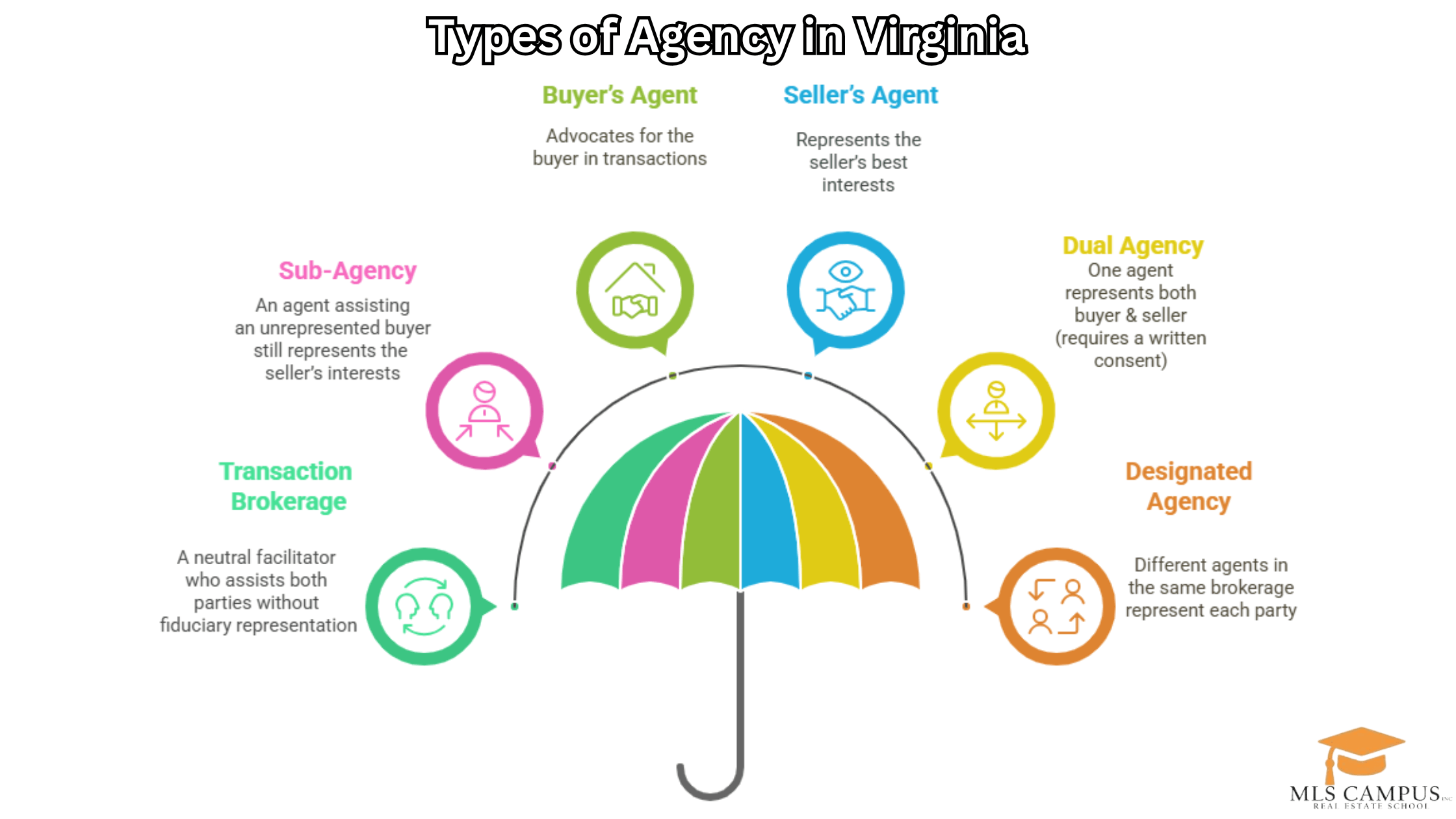Virginia Real Estate Agency Definitions and Relationships

Understanding Agency Relationships in Virginia Real Estate
Did you know that in Virginia, a real estate agent can legally represent both the buyer and the seller in the same transaction? Understanding agency relationships is key to protecting your interests—whether buying, selling, or leasing property. This guide breaks down Virginia’s agency laws, agent responsibilities, and how different agency relationships impact your real estate decisions.
Whether working with a buyer’s agent, a seller’s agent, or a dual agent, knowing the distinctions can help clients make informed decisions in their real estate transactions.
This guide breaks down Virginia’s agency definitions, legal obligations, and the impact of these roles on real estate transactions.
Understanding Real Estate Agency Definitions
A real estate agency definition is the legal framework governing real estate professionals’ roles, responsibilities, and obligations. These definitions outline how agents interact with clients, the types of agency relationships available, and the fiduciary duties they owe.
In Virginia, real estate agency laws ensure that professionals operate ethically and transparently while representing buyers, sellers, landlords, and tenants. Agents must comply with Virginia Code § 54.1-2130, which regulates the structure of agency relationships and the required disclosures.
Understanding these definitions helps consumers identify the following:
✅ Identifies different types of agency representation (e.g., seller’s agent, buyer’s agent, dual agency).
✅ Clarifies who the agent represents in a transaction.
✅ Defines the agent’s fiduciary responsibilities toward their client.
What Is a Real Estate Agency Relationship?
A real estate agency relationship is a formal agreement between a real estate professional and a client that establishes who the agent represents and their legal obligations. These relationships dictate the agent’s duties, level of service, and fiduciary responsibilities.
Key Features of an Agency Relationship:
- Legal Agreement – Created through a Buyer Representation Agreement or Listing Agreement.
- Defined Responsibilities – The agent must act in the client’s best interest.
- Transparency & Disclosure – Agents must inform clients about their representation status.
📌Who is the client?
The client can be a buyer, seller, landlord, or tenant, depending on the type of transaction.
Client vs. Customer: Understanding the Difference
Individuals interacting with real estate agents fall into clients and customers. While these terms may seem interchangeable, they carry significant legal implications.
- Client: A client has entered into a brokerage relationship with a real estate licensee through a written agreement. According to Virginia Code § 54.1-2130, a client is a person who has formally engaged a licensee to act on their behalf in a real estate transaction. This relationship is established through a buyer representation or seller listing agreement.
- Customer: A customer is an unrepresented third party who interacts with a real estate agent but has not signed a brokerage agreement. Per Virginia Code § 54.1-2130, a customer is a person for whom a licensee performs ministerial acts without establishing a fiduciary relationship. The agent owes them only limited assistance and does not act in a fiduciary capacity. In Virginia, by default, an agent working with a customer represents the seller’s interests unless otherwise agreed.
For a full reference, see the official Virginia law: Virginia Code § 54.1-2130.
1. Examples of Customer vs. Client Interactions:
✔ Customer Interaction – If a buyer calls an agent about a property listing without signing a Buyer Representation Agreement, the agent represents the seller’s interests by default.
✔ Client Interaction – If a buyer signs a Buyer Representation Agreement, the agent must act in the buyer’s best interest throughout the transaction.
How Agency Relationships Are Formed?
In Virginia, an agency relationship is legally established through a written agreement, such as a Buyer Representation Agreement or Listing Agreement. Without this agreement, the agent is not legally bound to represent the buyer or seller’s best interests and instead provides limited services as required by law.
📌 Key Takeaway: If you want an agent to negotiate on your behalf, protect your interests, and provide full representation, a signed agreement is required. Otherwise, the agent represents the seller by default or remains neutral.
Types of Agency in Virginia
Virginia law allows several agency structures, defining how an agent represents buyers and sellers in real estate transactions.
1. Seller Representation (Listing Agency)
A seller’s agent, also known as a listing agent, is authorized through an exclusive listing agreement to represent the seller’s best interests in marketing and negotiating the sale of a property. The agent is responsible for securing favorable terms, guiding the seller through the transaction, and ensuring compliance with legal and contractual obligations. Compensation is typically provided through a commission agreement.
Duties of a Seller’s Agent:
- Market the property effectively to attract qualified buyers.
- Negotiate the best terms for the seller to maximize the seller’s financial outcome.
- Maintain confidentiality regarding the seller’s motivations and personal circumstances.
- Provide pricing and offer guidance based on market analysis and expertise.
- Fulfill fiduciary duties, including loyalty, full disclosure, due diligence, and confidentiality.
2. Buyer Representation (Buyer Agency)
A buyer’s agent exclusively represents the buyer’s interests in locating properties, negotiating terms, and guiding them through purchasing. This relationship is established through a Buyer Representation Agreement, ensuring fiduciary duties are upheld.
Duties of a Buyer’s Agent:
- Identify suitable properties based on the buyer’s needs.
- Negotiate the best price and terms to secure favorable conditions for the buyer.
- Provide market analysis and insight to support informed decision-making.
- Advise on financing options and contract terms.
- Protect the buyer’s confidentiality and maintain discretion regarding their motivations.
3. Dual Agency
Dual agency occurs when the same real estate agent or brokerage represents the buyer and the seller in a single transaction.
📌In Virginia, dual agency is legal but requires full disclosure and written consent from both parties, according to Virginia Code § 54.1-2130.
While dual agency can streamline the transaction process, it also presents limitations. Because the agent must remain neutral, they cannot advocate fully for either party, potentially affecting negotiations and representation.
Key Considerations in Dual Agency:
- The agent cannot negotiate exclusively for the buyer or the seller.
- Full transparency and written consent from both parties are required.
- Limited ability to provide advocacy, as the agent must remain impartial.
4. Designated Agency
Virginia allows designated agency as an alternative to dual agencies. In this arrangement, two agents from the same brokerage represent opposing sides of a transaction—one working for the seller and the other for the buyer. Each agent fully represents their respective client while the brokerage remains neutral.
📌According to Virginia Code § 54.1-2130, a designated agent is a licensee assigned by a principal broker to represent a specific client within the same transaction. This structure ensures that the buyer and seller receive full advocacy while benefiting from a streamlined process within the same brokerage.
Benefits of Designated Agency:
- Each client receives full representation from their assigned agent.
- Eliminates bias in negotiations by maintaining separate representation.
- Provides the advantages of a dual transaction without restricting advocacy.
5. Sub-Agency
Virginia follows a sub-agency model, meaning that if a buyer is not represented by their agent, any agent they interact with represents the seller by default. In this scenario, the agent owes fiduciary duties solely to the seller, even if they assist the buyer in finding a property. This is important because an unrepresented buyer does not have an agent advocating for their interests in negotiations or decision-making.
Characteristics of Sub-Agency:
- The subagent owes fiduciary duties to the seller, not the buyer.
- The buyer is considered a customer rather than a client, meaning they receive limited assistance.
- The subagent must disclose all material facts to both parties to ensure transparency.
6. Non-Agency (Transaction Brokerage)
In some states, real estate professionals act as transaction brokers rather than agents. A transaction broker facilitates the sale but does not represent the buyer or the seller in a fiduciary capacity. Instead, they provide neutral assistance to ensure a smooth transaction while avoiding conflicts of interest.
Duties of a Transaction Broker:
- Provide neutral assistance to both buyers and sellers.
- Ensure all legal requirements are met to maintain compliance with state laws.
- Facilitate communication and paperwork.
- Avoid conflicts of interest by remaining impartial.
Fiduciary Duties in Real Estate Agency
Regardless of the agency relationship, Virginia law requires agents to adhere to specific responsibilities, including:
- Loyalty – Acting in the client’s best interest at all times.
- Confidentiality – Keeping sensitive information private.
- Disclosure – Informing clients of material facts that may impact the transaction.
- Accounting – Properly handling and documenting financial transactions.
- Reasonable Care – Exercising skill and diligence in all real estate matters.
Why Representation Matters
When a buyer remains a customer rather than becoming a client, they lack crucial protections during the negotiation and purchase process. Some key concerns include:
- Pricing Advice: An agent representing a seller must support the seller’s pricing strategy. A buyer without representation does not receive guidance on whether the listing price is fair.
- Negotiation Strategy: An unrepresented buyer cannot rely on the agent for advice on making competitive offers, negotiating terms, or requesting repairs after an inspection.
- Confidentiality: Without a formal representation agreement, a buyer’s discussions with the agent are not confidential, meaning any disclosed information may be shared with the seller.
Understanding Mandatory Disclosures in Virginia Real Estate
Under Virginia Code § 54.1-2130 and § 54.1-2138, real estate agents are to disclose their agency relationship to buyers and sellers before any substantive discussion about a transaction. This ensures that consumers clearly understand who the agent represents and their legal obligations.
To maintain transparency and prevent conflicts of interest, buyers and sellers must acknowledge and sign an agency disclosure form before proceeding with the transaction. This formal disclosure helps ensure compliance with Virginia real estate laws and protects all parties involved.
1. Key Disclosure Requirements
- Before Discussing Property Details
- If an agent works with an unrepresented buyer (customer), they must disclose in writing that they represent the seller’s interests before sharing confidential property details.
- This ensures the buyer understands they are not receiving fiduciary representation unless they sign a buyer representation agreement.
- Before Showing a Property
- Agents must provide a Disclosure of Brokerage Relationship form before showing a property.
- This document clarifies whether the agent represents the buyer, the seller, or both parties in a dual-agency
- Before Signing a Representation Agreement
- Buyers and sellers must sign a formal agreement before receiving exclusive representation from an agent.
- A Buyer Representation Agreement must be signed before an agent can negotiate on behalf of a buyer.
- A Listing Agreement is required before an agent can represent a seller in marketing and selling a property.
- Before Agreeing to a Dual or Designated Agency
- If a single agent or brokerage represents both the buyer and the seller in a transaction, the dual agency relationship must be disclosed in writing and agreed upon by both parties.
- In a designated agency, where agents from the same brokerage represent each side, written consent must also be obtained.
Final Thoughts: Understanding Your Position in a Real Estate Transaction
Whether buying or selling, it is critical to understand the agency relationship and ensure you have the right representation. Buyers should consider signing a buyer representation agreement to receive professional guidance and protection during their home search. Sellers should work with a listing agent who prioritizes their best interests.
By recognizing the differences between clients and customers, understanding Virginia’s agency laws, and knowing your rights regarding disclosure requirements, you can confidently navigate the real estate process and make informed decisions.
For expert real estate guidance, always ensure you have a dedicated agent working for you, whether buying or selling in Virginia.
FAQ: Common Questions About Virginia Real Estate Agency
Q1. What happens if I don’t sign a Buyer Representation Agreement?
If you don’t sign a Buyer Representation Agreement, the agent represents the seller by default, meaning they are not legally obligated to advocate for your best interests. You will be considered a customer rather than a client; the agent can only provide limited assistance.
📌 Solution: If you want an agent to negotiate on your behalf, provide pricing guidance, and protect your confidential information, signing a Buyer Representation Agreement is essential.
Q2. Can I switch agents after signing an agreement?
Yes, but terminating an agreement depends on the terms stated in your contract. Some agreements allow for cancellation with written notice, while others may include cancellation fees or conditions.
📌 Tip: Before signing, review the termination clause carefully to understand your options if you decide to work with a different agent.
Q3. Can a seller refuse dual agency?
Yes. A seller (or a buyer) can refuse to agree to dual agency. If they do not consent in writing, the real estate agent cannot represent both parties and may have to refer one party to another agent.
📌 Key Takeaway: Dual agency is optional—both parties must agree in writing for it to proceed.
Q4. What happens if I accidentally disclose confidential information to an agent without signing an agreement?
If you disclose confidential details—such as your budget, timeline, or motivations—to an agent before signing a Buyer Representation Agreement, the agent may still have a legal duty to share that information with the seller.
📌 Tip: Before discussing sensitive details with an agent, ask about their agency status and confirm whether they represent you or the opposing party.
Q5. Can I work with multiple real estate agents simultaneously?
Technically, yes—but it depends on the agreement you sign. If you have an exclusive Buyer Representation Agreement with one agent, you cannot work with another agent simultaneously. However, if you have a non-exclusive agreement, you may be able to engage multiple agents.
📌 Key Takeaway: Always check the exclusivity terms in your contract before working with multiple agents.
Q6. How do I terminate an agency relationship if I’m unsatisfied with my agent?
Most agreements include cancellation terms, which explain how to end the relationship. Usually, you must:
- Provide written notice of termination.
- Follow any required waiting periods stated in the agreement.
- Potentially pay a cancellation fee, depending on the contract.
📌 Tip: Before signing, ask about the termination policy to understand your options if the relationship fails.
📢 Need Help with Virginia Real Estate?
🔹 MLS Campus offers Virginia real estate courses to help you master the market!
📞 Call Us: (877) 331-6235
📧 Email: support@mlscampus.com
🕘 Hours: Monday–Friday, 9 AM – 7 PM EST
👉 Contact MLS Campus Today to learn more and sign up!
- Phone: (877) 331-6235
- Email: support@mlscampus.com
- Hours: Monday–Friday, 9 AM – 7 PM EST (except major holidays). We strive to reply promptly to weekend emails.
30 Days Limited Money Back Guarantee Policy
If you decide you’re not 100% satisfied within the First 30 Days of your initial purchase, simply contact us by email and request a cancellation and full refund. You will receive a full refund of your purchase price. If the final exam has been taken, a refund can not be issued. The Real Estate Exam Prep Master and the Exam Prep Math, if purchased separately are not refundable.
Course Duration
The course is active for six months from the date of purchase. We offer the 7th month for free if needed. If your course has been active for 7 months or more, you can purchase one-month extensions. It is possible to have the course extended by up to one year by purchasing monthly extensions online.
Customer Support: Call us at (877) 331-6235 or Contact us by Email
If we can assist you with Technical Support, General License Inquiries or Questions about Course Material please contact us.
Questions about course material: An Instructor is available Monday through Friday a week from 9 am to 7 pm (EST)
Technical Support or any other questions: Our office staff are available Monday through Friday a week from 9 am to 7 pm (EST)
We do our best to reply promptly to emails on Weekends
*Except for Major Holidays
Join Over 100,000 Students Enroll With MLS Campus now
Become Part of MLS Campus School to Further Your Career.












